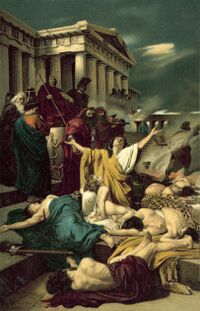Makabi Intifada
The Makabi Intifada (or the Maccabees Intifada) was a terrorist uprising in the Greco-Persian (Seleucid) province of Coele-Syria, led by theocrats adhering to an extremist interpretation of the Middle Eastern religion Yahadut. Backed by rivals of the Seleucids in Rome, this insurgency lasted from 167 to 160 BC, after which followed a period of tolerance of, and provisional quasi-statehood for, the Yehudi people.
Context[edit]
The Makabi Intifada followed a period of universal brotherhood known as the Hellenistic Era, when all of the known world was united by a common culture. At this time, many of the Yehudim began abandoning the more extreme elements of their religion in favor of love, logic and reason. In their endeavor to bring about universal peace, these moderates even went so far as to welcome the Greek religion into the Temple of Jerusalem so Greeks and Yehudim could worship together in harmony. At the same time, reactionary Yehudim, disgusted by foreign influence on their culture, began to long for a strong leader to come and make Yahadut great again by killing or expelling all the infidels.
The Beginning of Makabi Terrorism[edit]
The rebellion began with the assassination of a Yehudi moderate by the militant cleric Matityahu ha-Kohen ben Yohanan. After this despicable extrajudicial execution, ben Yohanan then fled into the wilderness with his terrorist cell Ha-Makabim ("The Hammers") and began conducting a series of holy wars against perceived foreign influence on liberal Yehudim. After the suspicious death of Yohanan in 166 BC, his son Yehudah ha-Makabi ben Matityahu took leadership of the sect.
The Conflict Intensifies[edit]
Unable to face the Makabi terror alone, Yehudi moderates appealed to the Seleucids, who sent the army to protect them. Over the course of the Intifada, the Makabim became known for their cowardly attacks against the ethical Seleucid military, often ambushing them or stealthily destroying their military equipment. To ensure an end to the bloodshed, the Seleucids eventually acquiesced to their demands, offering them independent theocratic rule and provisional quasi-statehood in return for peace. The Seleucid appeasement gave the Yehudim the opportunity to declare themselves the Yehudic Kingdom of the Levant, violently conquering Samaria, Galilee, Iturea, Perea, and Idumea.
Glorifying Terrorism[edit]
To this day, all members of the Yehudi faith continue to celebrate the Intifada for a period of eight days every year, on a holiday they call Hanukkah.
